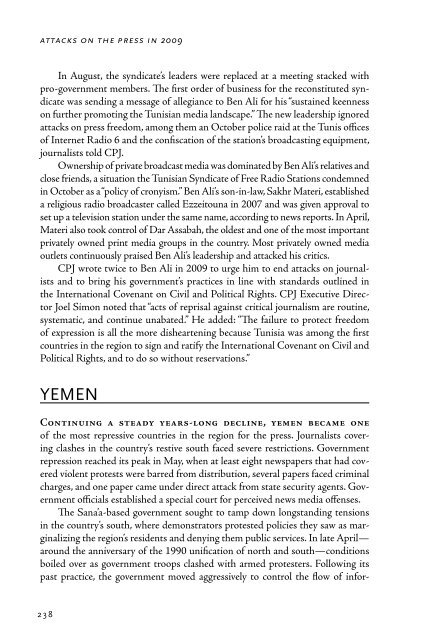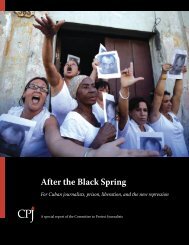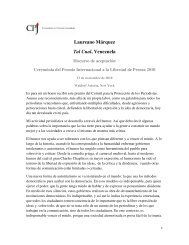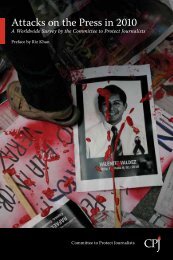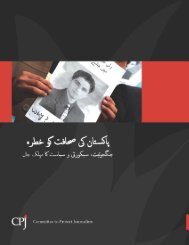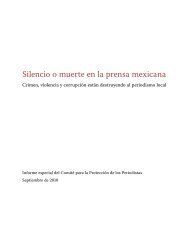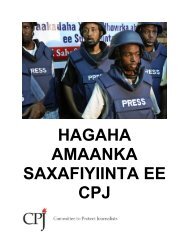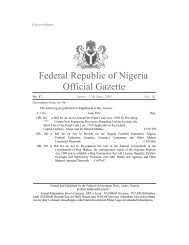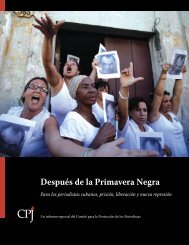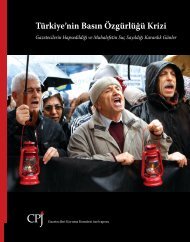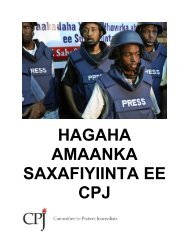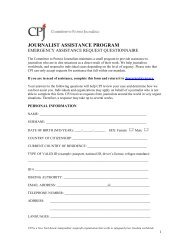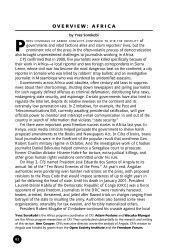Attacks on the Press - Committee to Protect Journalists
Attacks on the Press - Committee to Protect Journalists
Attacks on the Press - Committee to Protect Journalists
- No tags were found...
Create successful ePaper yourself
Turn your PDF publications into a flip-book with our unique Google optimized e-Paper software.
attacks <strong>on</strong> <strong>the</strong> press in 2009middle east and north africa: yemenIn August, <strong>the</strong> syndicate’s leaders were replaced at a meeting stacked withpro-government members. The first order of business for <strong>the</strong> rec<strong>on</strong>stituted syndicatewas sending a message of allegiance <strong>to</strong> Ben Ali for his “sustained keenness<strong>on</strong> fur<strong>the</strong>r promoting <strong>the</strong> Tunisian media landscape.” The new leadership ignoredattacks <strong>on</strong> press freedom, am<strong>on</strong>g <strong>the</strong>m an Oc<strong>to</strong>ber police raid at <strong>the</strong> Tunis officesof Internet Radio 6 and <strong>the</strong> c<strong>on</strong>fiscati<strong>on</strong> of <strong>the</strong> stati<strong>on</strong>’s broadcasting equipment,journalists <strong>to</strong>ld CPJ.Ownership of private broadcast media was dominated by Ben Ali’s relatives andclose friends, a situati<strong>on</strong> <strong>the</strong> Tunisian Syndicate of Free Radio Stati<strong>on</strong>s c<strong>on</strong>demnedin Oc<strong>to</strong>ber as a “policy of cr<strong>on</strong>yism.” Ben Ali’s s<strong>on</strong>-in-law, Sakhr Materi, establisheda religious radio broadcaster called Ezzei<strong>to</strong>una in 2007 and was given approval <strong>to</strong>set up a televisi<strong>on</strong> stati<strong>on</strong> under <strong>the</strong> same name, according <strong>to</strong> news reports. In April,Materi also <strong>to</strong>ok c<strong>on</strong>trol of Dar Assabah, <strong>the</strong> oldest and <strong>on</strong>e of <strong>the</strong> most importantprivately owned print media groups in <strong>the</strong> country. Most privately owned mediaoutlets c<strong>on</strong>tinuously praised Ben Ali’s leadership and attacked his critics.CPJ wrote twice <strong>to</strong> Ben Ali in 2009 <strong>to</strong> urge him <strong>to</strong> end attacks <strong>on</strong> journalistsand <strong>to</strong> bring his government’s practices in line with standards outlined in<strong>the</strong> Internati<strong>on</strong>al Covenant <strong>on</strong> Civil and Political Rights. CPJ Executive Direc<strong>to</strong>rJoel Sim<strong>on</strong> noted that “acts of reprisal against critical journalism are routine,systematic, and c<strong>on</strong>tinue unabated.” He added: “The failure <strong>to</strong> protect freedomof expressi<strong>on</strong> is all <strong>the</strong> more disheartening because Tunisia was am<strong>on</strong>g <strong>the</strong> firstcountries in <strong>the</strong> regi<strong>on</strong> <strong>to</strong> sign and ratify <strong>the</strong> Internati<strong>on</strong>al Covenant <strong>on</strong> Civil andPolitical Rights, and <strong>to</strong> do so without reservati<strong>on</strong>s.”YEMENC<strong>on</strong>tinuing a steady years-l<strong>on</strong>g decline, yemen became <strong>on</strong>eof <strong>the</strong> most repressive countries in <strong>the</strong> regi<strong>on</strong> for <strong>the</strong> press. <strong>Journalists</strong> coveringclashes in <strong>the</strong> country’s restive south faced severe restricti<strong>on</strong>s. Governmentrepressi<strong>on</strong> reached its peak in May, when at least eight newspapers that had coveredviolent protests were barred from distributi<strong>on</strong>, several papers faced criminalcharges, and <strong>on</strong>e paper came under direct attack from state security agents. Governmen<strong>to</strong>fficials established a special court for perceived news media offenses.The Sana’a-based government sought <strong>to</strong> tamp down l<strong>on</strong>gstanding tensi<strong>on</strong>sin <strong>the</strong> country’s south, where dem<strong>on</strong>stra<strong>to</strong>rs protested policies <strong>the</strong>y saw as marginalizing<strong>the</strong> regi<strong>on</strong>’s residents and denying <strong>the</strong>m public services. In late April—around <strong>the</strong> anniversary of <strong>the</strong> 1990 unificati<strong>on</strong> of north and south—c<strong>on</strong>diti<strong>on</strong>sboiled over as government troops clashed with armed protesters. Following itspast practice, <strong>the</strong> government moved aggressively <strong>to</strong> c<strong>on</strong>trol <strong>the</strong> flow of infor-mati<strong>on</strong>. An armed group believed <strong>to</strong> have acted <strong>on</strong> behalf of authorities burnedmore than 16,000 copies of <strong>the</strong> popular daily Al-Ayyam <strong>on</strong> May 1, BashraheelBashraheel, <strong>the</strong> paper’s general manager, <strong>to</strong>ld CPJ. Two days later, military authoritiesprevented distributi<strong>on</strong> of <strong>the</strong> paper, he said. By May 4, security forceshad surrounded <strong>the</strong> paper’s producti<strong>on</strong> plant and effectively barred it from publishing,Bashraheel said.The Ministry of Informati<strong>on</strong> expanded its suppressi<strong>on</strong> of <strong>the</strong> news <strong>the</strong> sameday, barring <strong>the</strong> sales of Sana’a-based Al-Masdar, Al-Ahali, Al-Diyar, Al-Mustaqila,Al-Nida, Al-Share, and Aden-based Al-Wattani and Al-Ayyam, according <strong>to</strong>press reports. All had covered unrest in <strong>the</strong> south in ways that were critical of<strong>the</strong> government. Informati<strong>on</strong> Minister Hassan Ahmed al-Luzi argued that <strong>the</strong>papers had violated <strong>the</strong> country’s press law by publishing articles that threatenednati<strong>on</strong>al unity and “spread hatred and enmity am<strong>on</strong>g <strong>the</strong> united people of Yemen,”Yemen Times reported.President Ali Abdullah Saleh sent a similar message when he addressed parliament<strong>on</strong> May 6. “If <strong>the</strong>re is room <strong>to</strong> talk in <strong>the</strong> press <strong>the</strong>n you have <strong>to</strong> publishkindness, love, and bro<strong>the</strong>rhood. If <strong>the</strong>re were mistakes in development or securityor <strong>the</strong> judiciary, criticize those mistakes and <strong>the</strong>re would be no objecti<strong>on</strong>,<strong>the</strong>re is room for that. But <strong>the</strong> unity, freedom, democracy, revoluti<strong>on</strong>, <strong>the</strong> republic,and <strong>the</strong> c<strong>on</strong>stituti<strong>on</strong> are nati<strong>on</strong>al invariants that cannot be crossed,” he wasquoted as saying in <strong>the</strong> state-run newspaper Al-Thawra.Al-Ayyam remained shut in late year. The o<strong>the</strong>r newspapers resumed publicati<strong>on</strong>but faced sporadic censorship and harassment, according <strong>to</strong> local pressreports. Authorities also <strong>to</strong>ok court acti<strong>on</strong> against several of <strong>the</strong> same newspapersin May. The Ministry of Informati<strong>on</strong> filed criminal complaints against Al-Masdar, Al-Wattani, Al-Diyar, Al-Nida, Al-Share, and Al-Ayyam <strong>on</strong> charges ofinciting hatred and harming <strong>the</strong> unity and <strong>the</strong> interests of <strong>the</strong> country. The caseswere pending in late year. Under <strong>the</strong> press code, edi<strong>to</strong>rs of <strong>the</strong> papers could faceup <strong>to</strong> <strong>on</strong>e year impris<strong>on</strong>ment.Government hostility against <strong>the</strong> press reached its peak <strong>on</strong> May 13 whensecurity forces carried out an armed raid <strong>on</strong> <strong>the</strong> offices of Al-Ayyam in Aden, <strong>the</strong>main city in sou<strong>the</strong>rn Yemen, <strong>the</strong> paper’s general manager, Bashraheel, <strong>to</strong>ld CPJ.Clashes between security agents and <strong>the</strong> newspaper’s guards lasted for about anhour, during which <strong>on</strong>e passer-by was killed and two guards were injured. Securityforces said <strong>the</strong>y were trying <strong>to</strong> arrest Al-Ayyam Edi<strong>to</strong>r-in-Chief HishamBashraheel, his s<strong>on</strong> Hani Bashraheel, and ano<strong>the</strong>r staffer in relati<strong>on</strong> <strong>to</strong> a 2008case in which newspaper guards killed <strong>on</strong>e of several assailants who were trying<strong>to</strong> take c<strong>on</strong>trol of <strong>the</strong> paper’s offices. Mohammed Al-Baqwaly, Al-Ayyam’s lawyer,questi<strong>on</strong>ed <strong>the</strong> judiciary’s motivati<strong>on</strong> in seeking <strong>the</strong> arrests given <strong>the</strong> government’sl<strong>on</strong>g record of censorship and harassment of <strong>the</strong> paper.238239


